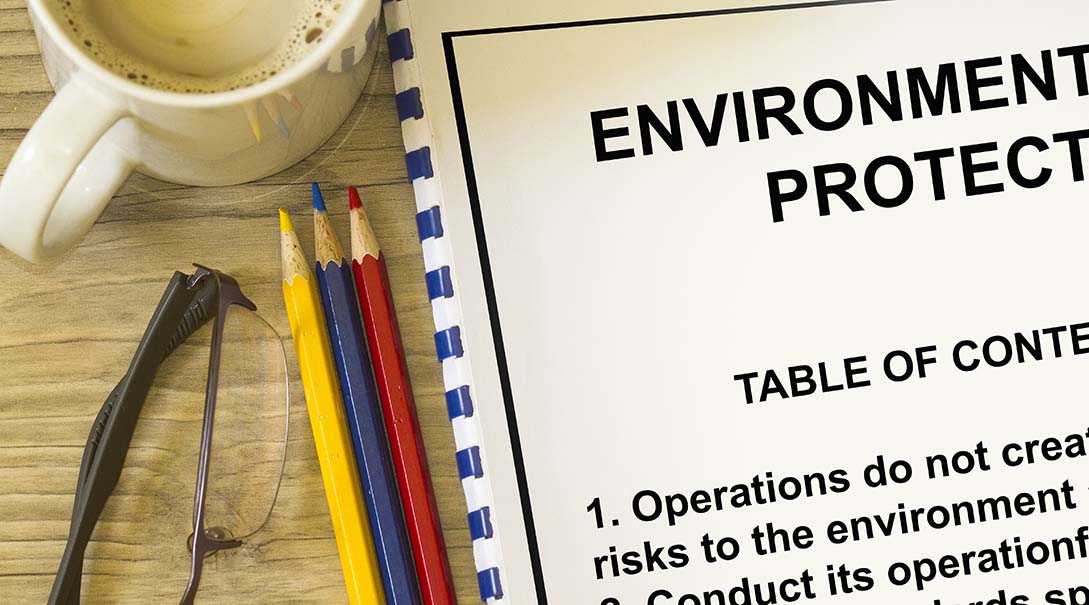Organizations in construction, engineering, mining, and many other such industries often perform work that, at least in theory, has the potential to cause environmental harm. It’s necessary for such companies to take steps to minimize the chances of their operations impacting the environment in ways that could have been avoided. They can achieve this essential goal by adhering to environmental compliance standards.
Table of Contents
What Is Environmental Compliance?
Environmental compliance is what it sounds like: a system that ensures your organization adheres to all the laws and regulations that may be applicable regarding how your work can impact the environment.
The key issue environmental compliance addresses is minimizing the degree to which a company’s operations negatively impact the natural environment. The United States Environmental Protection Agency enforces various regulations to keep organizations from causing environmental harm. Additionally, depending on the nature of your work and the areas in which your company operates, local governments and other agencies might have their own supplementary regulations you must abide by.
Environmental Compliance Example
Perhaps a company’s work sometimes involves the usage or handling of potentially hazardous materials. Odds are, regulations currently exist regarding the proper way to handle these materials to limit their chances of causing harm to either the environment, employees, or both.
A basic environmental compliance plan would describe precisely how an organization would ensure these regulations are accounted for. In this specific environmental compliance example, this may involve securing the necessary permits to handle these materials. Depending on the circumstances, it might also involve conducting tests or providing documentation to local governments or agencies to prove that a company’s operations didn’t cause environmental harm.
That’s merely one example. The essential point to remember is that environmental compliance standards can vary from one scenario to another. If you’re ever not entirely sure your company’s environmental compliance standards are sound, conduct further research and review your plans with specialists accordingly.
Why Is Environmental Compliance So Important?
Business owners and team leaders have many responsibilities. Ensuring they don’t harm the environment is one of them. If your work could negatively impact the environment, you must take steps to prevent this from happening.
That’s the primary reason environmental compliance standards are important. However, you should also consider certain practical factors when considering why your company would benefit from a strong environmental compliance plan. For instance, failure to abide by established environmental compliance standards can result in fines and similar consequences. By prioritizing environmental compliance, you’re protecting your organization financially.
You might consider the way proper environmental compliance can improve your brand’s reputation among customers as well. According to research, consumers across numerous demographics are increasingly trying to give their business to companies that emphasize sustainable operations whenever possible.
Today’s consumers want to know that companies are trying to avoid environmental harm. If you develop and implement an environmental compliance plan, you may be more likely to attract and retain customers.
Adhering to environmental compliance standards and regulations can also keep your employees out of harm’s way on the job. According to studies and surveys, workers tend to be more engaged when an employer takes steps to maximize employee safety. Higher levels of engagement among your workforce can translate to greater productivity, lower turnover rates, and numerous other advantages.
Primary Categories of Environmental Compliance
To truly understand what environmental compliance is, you will want to consider the different categories of environmental compliance that may apply to your operations.
Categories of environmental compliance to potentially keep in mind include:
- Water: It’s not uncommon for organizations across a range of industries to do work that has the potential to result in water contamination. They must guard against this.
- Spills: Spills involving hazardous materials can cause water contamination, soil contamination, and more. Any company whose operations involve such materials should address this in their environmental compliance plans.
- Air: It’s even possible for some operations to have a negative effect on air quality near a worksite, which can endanger both employees and anyone nearby.
Those are the primary categories. However, this is not an exhaustive list. You must account for the specific ways the type of work you perform could have environmental consequences when deciding what to include in your set of environmental compliance standards.
How to Prepare
Preparing to ensure your company adheres to environmental compliance standards begins with familiarizing yourself with those standards. Make sure you’re aware of any regulations that might apply to your organization and the work you do. Also, keep in mind that these regulations are sometimes updated and amended. Research them every year to ensure your environmental compliance systems and procedures are up-to-date.
It can also be helpful to review past instances when your company’s operations may have resulted in negative environmental effects, which is true even if these occurrences happened before you were involved with the company. Learning from past mistakes is key to avoiding future errors.
Consult with experts as well. Environmental compliance can be complicated and nuanced. It’s best to work with an environmental compliance company to avoid overlooking any gaps in your environmental compliance systems.
Partnering with the Right Environmental Compliance Company
Developing an environmental compliance plan can seem stressful for several reasons. Often, those who are responsible for developing and enforcing environmental compliance standards within their organizations lack the experience to do so confidently.
Luckily, this is not a task you need to handle on your own. At AOTC, we specialize in helping organizations across many industries properly comply with environmental laws and regulations. Contact us today to discover how our environmental compliance services will help your business.
